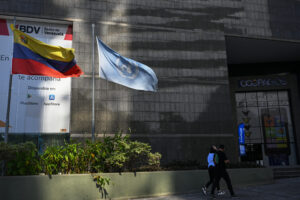The UN’s Role in Addressing Venezuela’s Crisis: A Multi-Faceted Approach to Humanitarian Aid and Political Solutions

The UN’s Role in Addressing Venezuela’s Crisis: A Multi-Faceted Approach to Humanitarian Aid and Political Solutions

The UN’s Role in Addressing Venezuela’s Crisis: A Multi-Faceted Approach to Humanitarian Aid and Political Solutions
The United Nations continues to play a pivotal role in addressing the deepening crisis in Venezuela, which has seen millions of people displaced, widespread food insecurity, and a severe breakdown of basic public services. With political, social, and economic challenges affecting nearly every aspect of Venezuelan life, the UN, through its various agencies and specialized organizations, has committed to providing humanitarian aid while facilitating dialogue aimed at resolving the country’s ongoing crisis.
At the heart of the UN’s efforts is a coordinated international response, led by the United Nations High Commissioner for Refugees (UNHCR), the World Food Programme (WFP), the Office for the Coordination of Humanitarian Affairs (OCHA), and the UN Human Rights Council (UNHRC), among others. Each agency plays a crucial role in mitigating the impacts of the crisis, which has placed immense pressure not only on Venezuela but also on neighboring countries, particularly Colombia, Peru, and Brazil, which are grappling with the influx of refugees.
The UNHCR, in coordination with local NGOs and governments in the region, has been at the forefront of efforts to assist the more than 7 million Venezuelans who have fled the country since 2015, escaping hyperinflation, political repression, and a collapsing healthcare system. Filippo Grandi, the UN High Commissioner for Refugees, has repeatedly called for increased international support for Venezuelan refugees and migrants, stressing the scale of the crisis, which rivals other major displacement situations globally.
“The situation in Venezuela remains one of the most challenging humanitarian crises in the world. We need the sustained engagement of the international community to ensure that Venezuelan refugees receive the assistance they desperately need,” Grandi said during a recent briefing at the UN headquarters in New York.
The World Food Programme (WFP) has also played a crucial role in addressing the severe food shortages that have affected millions within Venezuela’s borders. In 2021, the WFP negotiated an agreement with the Venezuelan government to expand its operations in the country, with a focus on providing school meals for children in the most vulnerable areas. According to David Beasley, Executive Director of the WFP, the organization is committed to expanding its reach to ensure that no child is left without food in Venezuela’s worst-hit regions.
“Our goal is to provide meals to 1.5 million schoolchildren by the end of the year, but this is just a fraction of what is needed. Venezuela’s food crisis is severe, and we are working tirelessly with our partners to meet the overwhelming demand for assistance,” Beasley said in a statement.
The UN’s response is not limited to humanitarian aid. The UN Human Rights Council (UNHRC), led by Michelle Bachelet, former UN High Commissioner for Human Rights, has been instrumental in documenting human rights abuses and advocating for accountability in Venezuela. In a landmark 2019 report, Bachelet highlighted widespread extrajudicial killings, arbitrary arrests, and torture under the government of President Nicolás Maduro.
“The human rights violations in Venezuela cannot be ignored. We are calling for independent investigations and for those responsible for abuses to be held accountable. The people of Venezuela deserve justice and a future free from repression,” Bachelet stated in her report.
The UNHRC’s work has drawn widespread international attention to the severity of the Venezuelan crisis, prompting calls for Maduro’s government to engage in meaningful dialogue with opposition forces. The UN has taken an active role in promoting these discussions, seeking to mediate a political solution that could pave the way for democratic elections and a peaceful resolution to the conflict.
The UN Secretary-General, António Guterres, has personally urged both the Venezuelan government and opposition groups to commit to talks. In a statement earlier this year, Guterres reaffirmed the UN’s position that only a peaceful, negotiated settlement can bring lasting stability to Venezuela.
“The UN stands ready to support Venezuela in its pursuit of peace and democracy. We call on all parties to engage in good faith and work toward a solution that meets the needs of the Venezuelan people,” Guterres said.
In addition to its direct efforts in Venezuela, the UN has also been working closely with neighboring countries, which have borne the brunt of the refugee crisis. Colombia, which hosts nearly 2 million Venezuelan refugees, has been a key partner in the UN’s regional response.
The Regional Inter-Agency Coordination Platform for Refugees and Migrants from Venezuela (R4V), co-led by UNHCR and the International Organization for Migration (IOM), coordinates the humanitarian response across 17 countries. This platform aims to streamline efforts to provide shelter, healthcare, and legal services to displaced Venezuelans.
“The support of regional governments, particularly Colombia and Peru, has been extraordinary. These countries have shown immense solidarity in hosting millions of Venezuelans, but they cannot shoulder the burden alone. It is critical that the international community steps up its efforts,” said Eduardo Stein, Joint Special Representative for Venezuelan Refugees and Migrants for UNHCR and IOM.
While the UN has made significant strides in addressing Venezuela’s humanitarian crisis, much work remains to be done. The UN has repeatedly called for greater financial commitments from the international community to meet the growing needs of Venezuelans both within the country and abroad. In 2022, the UN launched a $1.79 billion appeal to support displaced Venezuelans, but funding gaps persist.
The crisis has also underscored the need for a long-term political solution to restore democracy, ensure human rights, and rebuild Venezuela’s economy. The UN continues to emphasize that without political stability, the humanitarian situation will remain dire.
The UN’s involvement in Venezuela represents a multi-faceted approach, combining immediate humanitarian relief with long-term efforts to restore political and social stability. As millions of Venezuelans continue to suffer, the UN is committed to leading international efforts to ensure that they receive the help they need while advocating for a peaceful, democratic resolution to the crisis.
Do you find Tmaq Media useful? Click here to give us five stars rating!



















